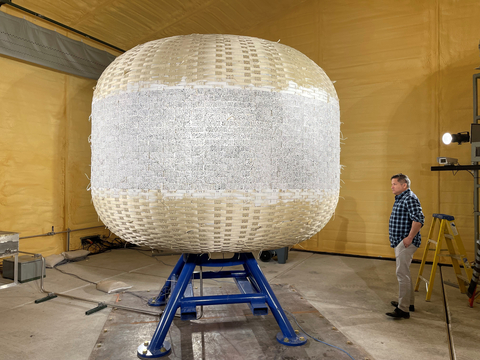Subscale Version of LIFE™ Habitat (Large Integrated Flexible Environment) Exceeds NASA Certification Requirements in Duration Test for Extended Human Missions
Sierra Space, a leading, pureplay commercial space company building the first end-to-end business and technology platform in space, announced today that the company’s LIFE™ habitat (Large Integrated Flexible Environment) successfully completed a third stress test – this time for duration – exceeding NASA certification requirements and demonstrating the inflatable structure’s integrity for sustaining human life in space for long periods of time.
This press release features multimedia. View the full release here: https://www.businesswire.com/news/home/20230131005408/en/

Sierra Space's LIFE (Large Integrated Flexible Environment) habitat completes third stress test – this time for duration. (Photo: Business Wire)
This latest assessment, called an Accelerated Systematic Creep Test, is a destructive materials testing method by which test engineers load the test unit – a subscale version of the inflatable habitat – with a sustained amount of pressure over time until it fails. The unit’s “softgoods” pressure shell burst after over 150 hours, exceeding NASA’s short-term, recommended creep duration target of 100 hours. High-strength softgoods materials are sewn and woven fabrics – primarily Vectran – that become rigid structures when pressurized and can provide safe and sustainable architecture for space habitation.
This latest creep test is a different kind of stress test than the two previous ones conducted in July and November, which pressurized units with increasing loads until they burst at maximum or Ultimate Burst Pressure (UBP). All three tests took place within six months, further demonstrating Sierra Space as a market leader in the development of softgoods inflatable habitat technology, a key step in facilitating extended human missions to low-Earth orbit, the moon and Mars.
“LIFE represents the essential technology developments needed to one day enable humans to live and work in space,” said Sierra Space CEO Tom Vice. “Habitat units are a key element in Sierra Space’s platform in space, and this crucial milestone illustrates that our team has exceeded programmatic requirements that validate critical aspects of the LIFE design. These results will propel us in 2023 as we mature the technology via full-scale development and continue toward full NASA certification.”
Sierra Space, its partner ILC Dover and NASA subject matter experts performed the subscale Accelerated Systematic Creep Test in December 2022, at NASA’s Marshall Space Flight Center in Huntsville, Alabama. The purpose of the test was to determine the duration of time that LIFE’s pressure shell could last during its on-orbit operational mission life.
NASA designed a climate-controlled, disposable building in which the test was performed. This building was specifically built to meet two requirements: 1) to protect the test article (Sierra Space’s pressure shell) during the duration of the test and 2) to be expendable once the article successfully burst upon maximum creep pressure and duration. Due to the explosive nature of the test, the team placed the sub-scale space habitat adjacent to the flame trench of the Saturn 1/1B test stand, where NASA tested rockets for the Apollo program.
“Sierra Space’s LIFE pressure shell has an on-orbit performance requirement of 15 years, but with softgoods, there is a ‘times four’ safety requirement set by NASA, so we must ultimately prove we’re viable for 60 years,” said Shawn Buckley, LIFE Chief Engineer and Senior Director of Engineering at Sierra Space. “Based on data from this first subscale creep test, we well exceeded the on-orbit mission performance requirement of 60 years for inflatable structures within our current architecture.”
The company will conduct a second subscale Systematic Accelerated Creep Test early in 2023. Stress tests on full-scale LIFE units will begin later in the year as part of Sierra Space’s ongoing softgoods certification process.
Sierra Space performed the 2022 subscale Ultimate Burst Pressure Tests as part of NASA’s NextSTEP Appendix A Habitat Systems contract, which is managed by NASA Marshall and falls under the pre-formulation habitation team in NASA HQ’s Exploration Systems Development Mission Directorate Technical Integration office. The Systematic Accelerated Creep Test was performed by Sierra Space under its LIFE softgoods certification. Sierra Space is focused on performing critical risk reduction tests and assessing LIFE’s extensibility to multiple space destinations including the moon and Mars.
Sierra Space’s LIFE is a key component of the company’s in-space destinations technology portfolio. The inflatable module is a three-story, commercial habitation and science platform designed to allow humans to live and work comfortably in low-Earth orbit and beyond. LIFE will serve as both the habitation and payload element for the Orbital Reef commercial space station, a collaboration between Sierra Space and Blue Origin.
Click here to view and download video of the Accelerated Systematic Creep Test.
About Sierra Space
Sierra Space (www.sierraspace.com) is a leading pureplay commercial space company at the forefront of innovation and the commercialization of space in the Orbital Age, building platforms in space to benefit life on Earth. With more than 30 years and 500 missions of space flight heritage, the company is enabling the future of space transportation with Dream Chaser®, the world’s only winged commercial spaceplane. Under construction at its Colorado headquarters and expected to launch in 2023 on the first of a series of NASA missions to the International Space Station, Dream Chaser can safely carry cargo - and eventually crew - to on-orbit destinations, returning to land on compatible commercial airport runways worldwide. Sierra Space is also building an array of in-space destinations for low-Earth orbit (LEO) commercialization including the LIFE™ habitat (Large Integrated Flexible Environment), a three-story commercial habitation and science platform designed for LEO. Both Dream Chaser and LIFE are central components to Orbital Reef, a mixed-use business park in LEO being developed by principal partners Sierra Space and Blue Origin, which is expected to be operational by the end of the decade.
View source version on businesswire.com: https://www.businesswire.com/news/home/20230131005408/en/
Contacts
Alex Walker
Sierra Space
(303) 803-2297
Alex.Walker@sierraspace.com
Allison Gregg
Griffin Communications Group
(256) 520-3985
Allison@GriffinCG.com














